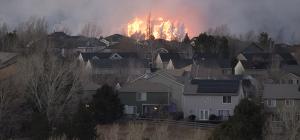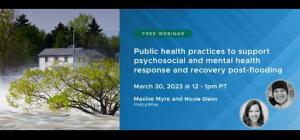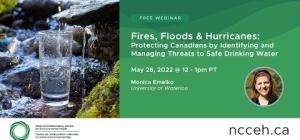
Innovative public health practices to reduce the impacts of flooding on community mental and psychosocial wellbeing
Flooding is the most common climate-related disaster globally, and floods are increasing in frequency across Canada. Floods have a significant and long-term impact on community mental health and psychosocial well-being. During and after such events, decision makers such as medical officers of health, public health practitioners, policy analysts, program officers, municipal government officials, and others play a key role in developing and delivering programs and policies to support mental and psychosocial health response and recovery. This project sought to draw on existing Canadian expertise and the literature to understand the impacts of flooding on mental health, as well as the innovative public health practices to help communities heal from disasters.
About the project
In this collaborative project funded by the National Collaborating Centre for Environmental Health (NCCEH), PolicyWise for Children & Families (PolicyWise) aims to:
- Increase decision makers’ understanding of the mental health and psychosocial wellbeing impacts of flooding on the people and communities affected, with emphasis on systemically excluded groups. Note that systemic exclusion refers social structures, policies, and practices that limit access to health, opportunities, and thriving for specific groups of people because of social characteristics such as race, class, and gender.
- Summarize community-level practices to mitigate the mental health and psychosocial wellbeing impacts of flooding and describe contextual factors that contribute to their effectiveness.
PolicyWise is experienced in generating and sharing knowledge regarding practices for decision makers to support post-disaster community mental health and psychosocial wellbeing. To meet project objectives, we established an advisory group made up of environmental public health and psychosocial disaster response practitioners and engaged in ongoing knowledge mobilization. We applied an equity lens throughout the process.
Project outputs
In this report, we drew on the literature, practice-based sources, and engagement with a pan-Canadian practice advisory committee to describe some of the experiences, challenges, and priorities for action regarding the psychosocial impacts of floods and community recovery.
A guide to post-flooding community-level psychosocial response and recovery practices in Canada (Myre and Glenn, 2023)
In this report, we identified seven public health practices that are necessary to support equitable and community-specific psychosocial and mental health recovery after flooding. The findings were based on consultation with our project advisory group, interviews with key informants, and a literature review.
In this blog, we summarize our webinar panel discussion in which we dialogued with four disaster recovery professionals about their experiences of supporting mental health and psychosocial recovery across Canada.
Webinar Recording - Public health practices to support psychosocial and mental health response and recovery post-flooding
During this webinar, Maxine Myre and Nicole Glenn from PolicyWise for Children & Families will present an overview of the experiences, challenges, and priorities of post-flooding community recovery, as well as describe public health practices that can be adapted and applied to communities across Canada.
About the authors

PolicyWise for Children and Families is an Alberta-based not-for-profit, charitable organization. We have 20 years’ experience mobilizing knowledge to shape policies, practices, and services in ways that benefit children, youth, families, and communities. During this time, PolicyWise has developed and implemented complex, collaborative projects in partnership with all levels of government, nonprofit organizations, community, and private sector organizations. Central to our approach is consideration of the structural barriers that marginalized groups face and the actions that can be taken to alleviate those conditions so that everyone has an opportunity to thrive.
Maxine Myre, PhD, is a Senior Research and Policy Associate with PolicyWise. She leads several projects related to child, family, and community well-being with a focus on community engagement, knowledge mobilization, and health equity.
Nicole Glenn, PhD, is a Research & Policy Manager with PolicyWise where she stewards knowledge mobilization and community-engaged applied public health and social sector research and evaluation. She brings a critical equity lens to all her work.








